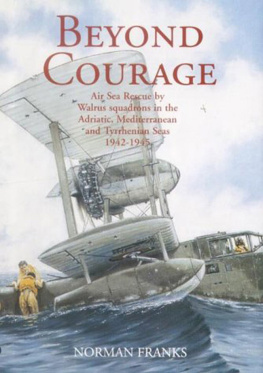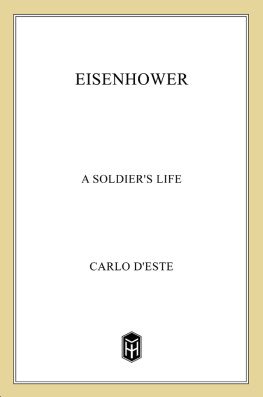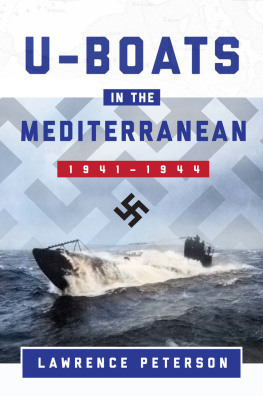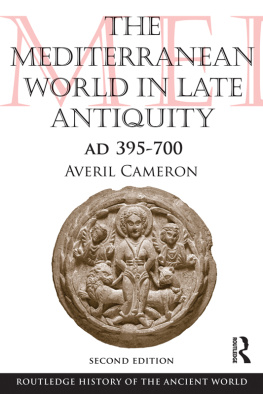Carlo DEste - World War II in the Mediterranean, 1942-1945
Here you can read online Carlo DEste - World War II in the Mediterranean, 1942-1945 full text of the book (entire story) in english for free. Download pdf and epub, get meaning, cover and reviews about this ebook. year: 1990, publisher: Algonquin Books, genre: History. Description of the work, (preface) as well as reviews are available. Best literature library LitArk.com created for fans of good reading and offers a wide selection of genres:
Romance novel
Science fiction
Adventure
Detective
Science
History
Home and family
Prose
Art
Politics
Computer
Non-fiction
Religion
Business
Children
Humor
Choose a favorite category and find really read worthwhile books. Enjoy immersion in the world of imagination, feel the emotions of the characters or learn something new for yourself, make an fascinating discovery.

- Book:World War II in the Mediterranean, 1942-1945
- Author:
- Publisher:Algonquin Books
- Genre:
- Year:1990
- Rating:4 / 5
- Favourites:Add to favourites
- Your mark:
- 80
- 1
- 2
- 3
- 4
- 5
World War II in the Mediterranean, 1942-1945: summary, description and annotation
We offer to read an annotation, description, summary or preface (depends on what the author of the book "World War II in the Mediterranean, 1942-1945" wrote himself). If you haven't found the necessary information about the book — write in the comments, we will try to find it.
Recounts events in the Mediterranean during World War II, including how the inexperienced Americans gained combat experience and learned to work together with the British.
World War II in the Mediterranean, 1942-1945 — read online for free the complete book (whole text) full work
Below is the text of the book, divided by pages. System saving the place of the last page read, allows you to conveniently read the book "World War II in the Mediterranean, 1942-1945" online for free, without having to search again every time where you left off. Put a bookmark, and you can go to the page where you finished reading at any time.
Font size:
Interval:
Bookmark:
MAJOR BATTLES AND CAMPAIGNS
John S. D. Eisenhower, General Editor
1. The Defeat of Imperial Germany, 19171918,
by Rod Paschall
2. World War II in the Mediterranean, 19421945,
by Carlo DEste
3. Battles of the Revolutionary War, 17751781,
by W.J. Wood
MAJOR BATTLES AND CAMPAIGNS
19421945
By Carlo DEste
Lieutenant Colonel
United States Army (Ret.)
With an Introduction by
John S. D. Eisenhower
ALGONQUIN BOOKS OF CHAPEL HILL
Published by
ALGONQUIN BOOKS OF CHAPEL HILL
Post Office Box 2225
Chapel Hill, North Carolina 27515-2225
a division of
WORKMAN PUBLISHING
225 Varick Street
New York, New York 10014
1990 by Carlo DEste. All rights reserved.
LIBRARY OF CONGRESS CATALOGING-IN-PUBLICATION DATA IS AVAILABLE.
E-book ISBN 978-1-56512-914-6
Photograph Section 1
Photograph Section 2
by John S. D. Eisenhower
GREAT HISTORICAL EVENTS need reevaluation from time to time. Though we usually know the basic facts of any world event in rather short order, interpretations of them change with the passing of time. And, of course, new information becomes available. New facts, though not many, appear. But with the passage of time we receive more information regarding the viewpoints of the participants after they have had time to reflect or, in some cases, as they feel more free to express their true opinions. Thus it is incumbent on all of us interested in history to maintain open minds and be ever ready to consider new challenges to the accepted wisdom that often perpetuates historical myths.
This book, by a prominent military historian, Lieutenant Colonel Carlo DEste, United States Army (Ret.), comes at a natural time for a reevaluation of the Allied campaigns in the Mediterranean. Forty-five years have gone by since World War II ended. A new generation of writers, Colonel DEste among them, can now examine the old shibboleths, free of the supposed truths on which we were raised. And he is just the author to do itexperienced, educated in the U.S. Armys best schools, and irreverent enough to examine every idol with a skeptical eye.
The Mediterranean theater of war, World War II, can benefit to an unusual degree from such a new look. As a secondary theater during the later stages of that conflict, the Mediterranean has been given less attention than the more celebrated OVERLORD, the invasion of Northwest Europe. The cross-Channel invasion, from D-Day on 6 June 1944 until V-E Day, has been written about again and again. (DEste himself is the author of a notable book on the Normandy campaign.) Every detail of the conduct of OVERLORD has been examined and reexamined. The war in the Mediterranean, on the other hand, has been neglected, its contemporary mythology virtually unchallenged. This book is therefore extremely timely.
It is ironic that the Mediterranean has been relegated to the back shelves of the military libraries of World War II, for it was secondary only in comparison to OVERLORD. In the U.S. Fifth Army in Italy, during only one campaign of the Mediterranean, battle deaths among Americans, British, and French amounted to an astonishing 32,000 men. That staggering figure almost equals that of the 33,000 American troops killed during the entire Korean War (195053). It even compares to the number (47,300) killed in the ten-year Vietnam conflict (196372). The hardships endured in the Italian campaign were, by and large, more severe than those in Northwest Europe, and the psychological strain on its participants far more devastating. By no means do these figures denigrate the traumas undergone by our soldiers in other conflicts; they merely explain our wonder at how such a large campaign as the Mediterranean could be treated as secondary.
Colonel DEste has done a masterful job in telling this story. He has struck a fine balance between evaluating the high-level direction of the war and describing the horrors of the fighting. He brings to life the difficulties both sides experienced in moving tanks, artillery, and supplies through the mud of the Apennines. One finishes reading this book with the feeling of actually having been there, at the Factory on the Anzio beachhead, in the comfortable Fifth Army headquarters in Caserta, or in a vulnerable glider being towed through enemy and friendly fire to indistinct drop zones in Sicily. Whereas some accounts keep the reader in the sterile atmosphere of the army operations room, while others concentrate entirely on the sufferings of the Mauldin-type Willies and Joes, DEste shows the reader both, and with admirable balance.
It is, however, in the realm of the generals that any war book can spark controversy, and this book provides more than its share of that. The authors treatment of those very human and vulnerable men who were entrusted with such crushing and awesome power is sympathetic but unfettered by common American views and prejudices, and the reader may be in for some surprises.
The three main specimens who come under Colonel DEstes microscope are two British generals, Sir Harold R. L. G. Alexander and Bernard Law Montgomery, and one American, Lieutenant General Mark Wayne Clark. All three eventually attained the highest rank their respective countries had to offer. That fact, however, spares none of them from the authors critical pen.
Of the three, the picture of Clark differs least from the accepted view. Clark, known as Wayne in the U.S. Army, was a young, energetic, aggressive, and extremely ambitious officer. A master of army politics, Clark found himself thrust into combat for the first time as commander of the U.S. Fifth Army at the nearly disastrous Allied landing at Salerno (9 September 1943). The readerat least this oneis taken aback to learn how very inexperienced the self-assured Clark was when it came to real fighting; the techniques he had learned in army politics were useless on that precarious beachhead. But Clark learned. And even though he is rightly faulted by the author for his thirst for publicityand for his near paranoia when it came to imagined British infringement on his own rights, the text shows that Clark grew to the point where he was ultimately able to function in concert with the rest of the Allied team.
Incidentally, much credit must be given to British Prime Minister Winston Churchill for recommending Clark to be the 15th Army Group commander (in place of Alexander) in the latter days of the war, for in that position Clark had under his command the famed British Eighth Army. The gesture also illustrates the extent to which Clark had grown in the course of the years fighting in Italy.
In a way, Colonel DEstes evaluations of Alexander and Montgomery are even more interesting than his handling of Clark, because the way he rates them is exactly opposite to the accepted American view. American accepted wisdom has depicted Montgomery as abrasive, egocentric, ruthless, cautious, and incompetent. DEste agrees that his personality was abrasive, but argues forcefully that there was nothing incompetent about Monty. According to these pages, Montgomery was right far more often than he was wrong when it came to tactical disagreements. In fact, Monty appears in these pages to be close to infallible. Particularly with the onset of preparation for the invasion of Sicily, Monty seems to have been the only high-ranking Allied officer who was remotely interested in what was being planned. He had definite ideas as to how forces should be disposed, and he carried his points by dint of his personal force and determination. The story of Montys cornering Eisenhowers Chief of Staff, Walter Bedell Smith, in an Algiers latrine may be overplayed, but it illustrates the point.
Next pageFont size:
Interval:
Bookmark:
Similar books «World War II in the Mediterranean, 1942-1945»
Look at similar books to World War II in the Mediterranean, 1942-1945. We have selected literature similar in name and meaning in the hope of providing readers with more options to find new, interesting, not yet read works.
Discussion, reviews of the book World War II in the Mediterranean, 1942-1945 and just readers' own opinions. Leave your comments, write what you think about the work, its meaning or the main characters. Specify what exactly you liked and what you didn't like, and why you think so.









